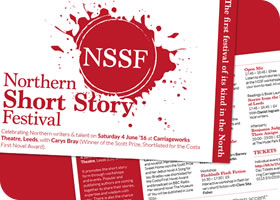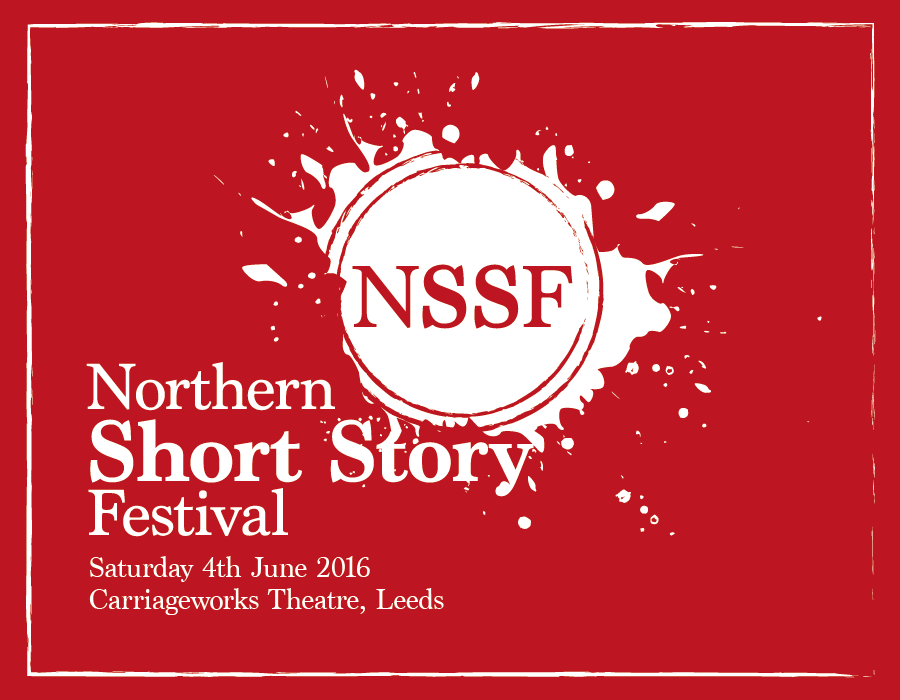Acclaimed short story writer Barney Walsh gives us End of the World in advance of his appearance at the Northern Short Story Festival on Saturday 4th June at the Carriageworks Theatre, Leeds. Join Barney, along with David Martin as they read their work, and discuss the North’s unique literary culture in the Dark Side of the North event, with SJ Bradley. You can win 2 free tickets to this event. Full details at the end of this post.

Dead today, the pub. Dead like night though the sky’s at its burningest ever out there now. Bright sun scalding and the world seems dead, empty. One of those global-warming days when I think if what my mum sees isn’t true yet, well it will be soon. End of the world, any day now. Maybe already – maybe us two, me behind the bar, him stood at the fruit machine, we’re the only ones left. Got to restart the human race, his hands on me, I’d kill myself first. Die a virgin first. At nineteen. Kill him first, better – but he’s already dead. His back to me, thank God – shudder at his face, can’t help it. His eyes on the spinning fruits and things, flickering faster than his brain cells. Never washes nor cuts his hair or fingernails. Shoulders so rounded they’ll fall off soon. Playing the fruit machine, tapping at random. Beeping noises like intensive care gone bad, gone worse, gone all messed up. He works nights so he drinks afternoons, always alone, comes here pouring his money away, drops it coin by coin out of his life for ever. It’s the money he got selling his soul, which wasn’t a lot – not enough anyway to stop working nights.
Hate dead afternoons like this, nothing to do but get trapped in your own head. And this the worst ever. Nothing is moving and nothing has moved ever. Hours till my shift ends. I lean on the bar, elbows in the sticky, waiting for nothing to happen – and it does, nonstop nothing. Glossy magazine for flicking through but my eyes won’t focus, the pages won’t turn, the air’s too thick. Door wedged open to let in a breeze but breezes have other ideas, obviously, better places to be. Dark like a cave, too, the pub, feels like you’re going blind in here; windows layered so traffic-mucky real light can’t get in. Red wallpaper blackened and yellowed by decades of before-the-ban fag ash, like being inside a smoker’s blood clot or something. The open door I can see from here, oblong slab of the world outside, trying to convince me it’s real. Speckled yellow and green. Pretend like I could get up and walk through it, into another world. I’ve texted some friends but nobody’s replying. Frightened of me, my mum’s shadow. Got lives to go to, they all do. They work or go to lectures and actually do something, not nothing like me. Nothing and work and Mum and nothing, that’s my life. And the boiler’s packed up. Can’t see how we can afford a new one, not for ages.
Fruit Machine creeping up to the bar again, shouldering the wall, come for his same-again. Be glad of the distraction if it were anybody but him. One reason for whisky is so I’ve to turn to the optics and he can stare at me in my short skirt, at my legs and bum, bum and legs. I see him in the mirror, his eyes up and down. The one trailing the other just a bit. He looks with hope. As if. No, not with hope, with I don’t know what. God please let me never ever know. A double Scotch he drinks right down stood there at the bar; his pint of blackish stuff he’ll take and prop on top of the machine, sup it slowly and then all at once faster.
‘How’s your mam?’ says a voice scraped raw.
I drop the pint glass. Drop it and catch it, glass clinking on my ring – a little noise I like, usually. ‘Who told you about my mum?’ I say, sharp as broken glass, glittering maybe.
‘Everybody knows.’ He shrugs lopsidedly; his head rolls to the edge and teeters at the brink. ‘Keeping all right, is she?’
Sorry he tried now. Friendly he can’t do. Sickly smile, smile like radiation poisoning. His eyes and their lids caving in on themselves.
‘She’s fine,’ I say.
Everyone knows, and laughs. Lost her marbles, I see them snigger, the bits and bobs of her mind. Or they smile pityingly. Her brains slipped through her fingers. Better off if it were true but really she’s still in there, I know. At home now up in our attic flat in the dark. Where she always is. I can see her. No noise at all when I’m not there chattering inanely, inane as I can just so it’s not silent. Our unlicensed telly switched on, tuned to static. Sometimes, moving so slow I can’t see her move, sometimes she creeps right up close so it should hurt her eyes, dust on the screen and static electricity prickling her dead hair. As if searching for even the faintest flash of signal in the noise, sign of a survivor, someone left alive in a world she knows ended years ago.
Sickly Smile’s whisky doesn’t touch the sides. Don’t look at his lips. Worms pulsing with blood drained from the rest of his skull. The beer pump shrieks. I’m pulling his pint and at the same time my phone starts sing-song beeping a call coming in and also the beer runs out.
‘You answer that, love, I’ve no rush,’ he says. Lying: there’s a clawing deep in his gut. That word love from that ghoul’s drooping smile. But I look at the incoming number, it’s the hospital, press red to stop it. I go change the barrel. The cellar down a few steps and cold on my legs, a relief, but cobwebby in my hair. How does it get like this, it’s not for real. If there’s ghosts I don’t want to know about it. Switch barrels quick and back up. Hollow Dead Eyes waiting without hunger or life in those sockets but licking his lips, hands spread out on the bar, sweat lifting the varnish off. I pour him his double, his eyes on my backside again. He drinks it right down as if I might snatch it back off him, then at last he gets his beer. I’m putting the pint down on the bar but he reaches and grabs it off me. Beer dribbles over my fingers – worse, a couple of his long, ugly, yellow-cracked never-cut nails touch my hand. I almost scream, can’t help a step back. He’s to go away now, now-now-now, back to the fruit machine so I can wash my skin he touched in the sink without him seeing. Scrub till it bleeds. Itches, burns. Blistering. His poison seeping in. But he’s still here. His head tipped forwards over his pint, greasy stringy grey hair dripping. Glad he never looks you in the eye – couldn’t stand that touch, either. Be worst of all.
‘Beautiful girl like you, your life wasted in this dump.’
Don’t say a thing.
‘Clever girl too, I bet,’ he says, colourless specks of flesh stuck in his teeth. ‘Beautiful girls are always cleverer, matter what they say. When they’re not trashy-like, like you’re not. Should’ve gone uni, you should. But you you’re a good girl, look after your mam.’
‘Piss off.’
But arguments bubbling again in my head: send her back to the loony bin – can’t call it anything else – wouldn’t it be best? No not after last time, remember I promised. Only time she came to life in years was to plead with me to take her from that place. Way she plucked at my sleeve. Her eyes wobbly wet jelly. But dry ever since – which is worse?
Greasy Stringy lifts his head, his eyes flicker up over my chest, miss my face, find the ceiling. He drags a yellow-clawed fingertip slowly down his beak, scraping a groove in his blackheads. ‘Aye,’ he says, taking his pint and going back to his only friend, little sticky sounds as he limply paces the beery carpet. Should feel sorry for him but really deeply I don’t.
Stain on my skirt of splashed beer, sticky on my bare knee. Scrub my hand like I hate it. I want my mum. Doing that and I see there’s two empty whisky glasses on the bar. I’ve poured him twice by mistake and charged him one. Distracted by the scary cellar and scarier phone. He didn’t say, course. Means, because I can’t go speak to him, can’t go tap him on the shoulder say hi but, means I’ve to get my own pennies out, pay for the extra myself and don’t get paid while Friday. Stupid, stupid. I want my mum. Want to phone her and hear her voice like it used to be but course she doesn’t answer the phone any more. Dead people don’t answer phones. While I’m out working she sits doing nothing. In the dark believing she’s dead when all it’d take is a few paces to the sun. Just sitting there she can smell herself decay, imagine that. Hallucinations of her own putrefaction, that psychiatrist said with relish nearly glee, staring at my breasts, that time I nearly hit him. Holding Mum’s hand, I was. Her head bent chin to chest, worse even than usual. Silvery sliver of drool I caught in a tissue. I’m an orphan but my mummy’s dead body still lives at home.
Now nothing’s happening all over again, just like the last million billion times. Need something, something to take hold of my brain before I lose it. Can you be bored and panicked at the same time? And for years together, nonstop? Just for something to do I mess with my bits of makeup again. But I look in the mirror behind the bar, peer between dusty glasses and bottles, and don’t know what I’m looking at. Whose face is that? Some girl I don’t know, badly drawn like the artist was poorly. I lift my blunt lipstick and she does too, like she’s taking the piss. But she’s not laughing. Face made up to make her look alive, only it’s not working too well. Her green eye shadow’s maybe too much, but she only wanted to look like someone who has a life. This summer burning everything and still she’s so pale, this girl is – all that sun out there and she can’t catch a drop of it, even in her short skirt and silly little top. Dark hollowed eyes, reminding me of someone, cheeks sucked in gaunt – she’s on drugs is maybe what you’d think.
Back away from the mirror. Don’t look. Look at something else. Distraction, distraction. Let my mind fall elsewhere. Anywhere elsewhere. My mobile, one missed call, new voicemail. Automatically I listen to it, a woman’s voice my age or so – for a milli-moment I mistake it for me – saying briskly, ‘Hello, this is Megan calling on behalf of Doctor Karim. I’m afraid that due to the unforeseen he’ll have to cancel your mother’s next appointment, you know, on the third? We’ll write to you shortly with a new time, sorry for any inconvenience…’ And then she pauses, Megan does, biting a knuckle, glancing around to check there’s no one listening, before she goes on in a new voice, not so brisk, softened to whisper, not doing her job any more: ‘Lucy, you never called me and you promised you would. Please call me. I need to see you again. You do need to talk, you know. Not only to yourself. I wouldn’t upset your mum again, not for the world. But I have to see you. Because it’s like, like… But, I mean, so maybe you lost my number…?’ and she tells it me again, her number that’s not lost at all, that I’ve had scribbled down on a tightly-folded bit of paper in my pocket always with me and never used weeks now.
She struggles on a bit more, Megan does, I listen numbly, but she gets herself confused, thinks she’s not reaching me, ‘…oh, I talk all wrong,’ she says, and gives up, hangs up. I stand there listening to the phone’s tones as if there were more I’m hearing. An hour and longer she’ll spend now, all afternoon and into the evening, slapping her forehead and gnawing her lip and dithering whether to try again, how long to leave it. We haven’t all the time in the world.
She doesn’t know what happened, my mum doesn’t. One day she woke up and it was all gone. Imagine that. All she could see was ashes. She stepped slowly back from the window, lay down and curled up on the bed and then she was gone too, my mum. All day and all night with her, holding her hand, stroking her face and hair and pleading with her to get up, to say something, anything. First day of school that ever I missed. She could hear me, her daughter, her only child, but she knew she’d died so she couldn’t do anything, couldn’t say a thing. She could feel her heart stopped and her breath gone. Pain except no pain because no pain for the dead. And her body beginning to rot.
I put down my mobile and walk calmly outside. Shiveringly calm. I walk with my eyes closed and then open them to the sky. After the pub’s dark the light hurts. Pain that I like. Sun hits my legs and arms and face, I feel my skin burning already, turning porcelain to bronze. Don’t think about sun-cancer. There’s air, too, at last. I gulp it in, let it melt coolly into me. From inside the pub, his claw still mechanically scraping at the plastic buttons, the Zombie watches me through a dirty grey window that makes him look ghastlier than ever. Ghastly a word I remember learning because it was in a storybook on my mummy’s knee when I was just a little girl. Safe on my mummy’s knee. The Ghoul in there like one of those scary pictures, scary but for kiddies, harmless in the end. And I don’t look back. He can’t follow me outside, has to shelter from the sun by day.
At home the curtains have always to be closed, the flat dark like a cave, because if Mum sees what’s outside she gets upset. Who wouldn’t who saw what she can see? And I can see it too sometimes, at odd times the sight just claws itself out at me: the bombs at last gone off, or an asteroid smashed down, or the world just burnt itself out, or whatever, everything destroyed, everybody dead leaving only ashes. Softly falling ashes tiny white grey leaves. Covering everything, no colour anywhere; great dark clouds filling a low heavy sky that won’t clear for millions of years. Blotting out the sun, only blotting’s not the word. All life gone, no birds. Trees crumbling glassy-charcoal skeletons, and real skeletons too, of people, all blackened, lying about the street, flesh burned away. Smoking rags of clothes clinging. Burnt shadow scorched on to a wall of a child vaporised. Burnt so sharp you can see her teeth as she screams. This is all my mum sees. And I see it too, sometimes. See the sky thicken and darken and fray into ashes, caving in on itself. I can scrunch up my eyes, knuckle them hard for the pain, look again and see the colour come back … but sometimes not, not for a while. And this is all that’s left for her, is all she has.
And she’s me. She has me, I mean. She sees me, I know she does. When I wash and dress her every morning sometimes her eyes hit mine. Sometimes I think she might speak. I dream she might smile suddenly, light her eyes and say it’s okay, I’m better now, it’s okay. I still fondly hope one of these days she might at least slur a word or two, my name maybe. When I kiss her and leave her and go to work for the few part-time hours I risk leaving her alone. And she must be amazed, somewhere deep down, every time I come home alive. I must seem a miracle to my mum. The only survivor. I alone have been spared. I’m the only one left alive in the world, everybody else is dead. I must be so lonely. Lift the phone there’s not even a dial tone. No one to talk to. Just me. And every day I go out into that wasteland, out with the radiation and mutants, or ghosts, and somehow manage to scavenge some food from somewhere, to stay alive. She can’t see it’s all packaged up in environmentally-unkind plastic bags, with receipts I leave lying about. She doesn’t notice I make her eat too, spoon-feed her like a baby while she stares at the wallpaper seeing no pattern whatever in its fraying yellow swirls.
I walk, knowing I have to go back soon. We need the money, got to work. The Mutant will want more booze any minute, that bunch of alcoholic schoolteachers will tumble in in a bit, there’s a lollipop lady glowing yellow because kids are pouring let loose from school. Birds bounce singing off trees; a scruffy-looking dog walks a scruffy-looking man. There’s a patch of grass and trees, and flowers whose names I’ll never know. The grass cut only this morning so of course I have to lie down in it. Grass stains on my clothes as if I’ve got a life. I lie on my back and stretch out in the sun. The sky above me is not dead it’s blue. And it hurts my eyes but that only means I can see it, the sun. Fresh-cut grass I squeeze through fingers turning green. I have to go back, but not for a moment. See, Mum, look at this, here I am. I can’t cure you but I can save myself, sometimes. Got to remember this. And that means I can save you too, sometimes. Look, Mum. All this loveliness. Yes I know there’s the rest but still. There’s this. There’s this, there really is. I hold on to the earth, feel its roll beneath me, dig my fingernails into it, and it’s there, it’s there. A worm wriggles under my fingers; a bird, a blackbird but brown-coloured so she’s a girl blackbird, lands not far from my face and looks at me as if she might know me. Tilts her head trying to place me. Flicks her wings to say hi. See, I tell you and I tell myself, again and again, grass is green it’s not burnt black it’s not a colour grey like ash. It’s real. It’s all real. And it’s still here, still here.
Not gone yet.
The grass is damper than it looks.
Nineteen.
Please, Mum. Time to wake up. Hold me and hug me and convince me I’m not lying to you.
The Dark Side of the North. Reading and Discussion Event with Barney Walsh and David Martin
4.30pm -5.30pm, Saturday 4th June at the Carriageworks Theatre, Leeds as part of the Northern Short Story Festival.
Join acclaimed short story writers Barney Walsh and David Martin as they read their work, and discuss the North’s unique literary culture, with SJ Bradley.
Tickets: £4. Click here to book your tickets, or enter our competition for a chance to win 2 free tickets. Simply retweet this article and copy @NoShoSto on Twitter, share it on your Facebook page and copy @BigBookend or email us with “Dark Side of the North Competition” in the subject title to info@bigbookend.co.uk. The closing date for entries is 9pm, Tuesday 24th May 2016. The winner of the 2 free tickets will be notified on Wednesday 25th May and will be chosen at random.
 Barney Walsh is a graduate of the University of Manchester’s MA in creative writing. He reads and selects stories for Litro Online’s StorySunday slot, and his own fiction has appeared in Willesden Herald: New Short Stories 7, The Big Issue in the North: Award for Short Fiction 2013, Unthology 4, The Warwick Review, Unthology 7, Litro Magazine, Shooter Literary Magazine, and The Manchester Review.
Barney Walsh is a graduate of the University of Manchester’s MA in creative writing. He reads and selects stories for Litro Online’s StorySunday slot, and his own fiction has appeared in Willesden Herald: New Short Stories 7, The Big Issue in the North: Award for Short Fiction 2013, Unthology 4, The Warwick Review, Unthology 7, Litro Magazine, Shooter Literary Magazine, and The Manchester Review.
David Martin was shortlisted for the Big Issue in the North prize and his stories have been published by The London Magazine, Valley Press and Dead Ink Books. His collection of short stories, Only Shadows Move, is available now, and he tweets @lordsludge.

